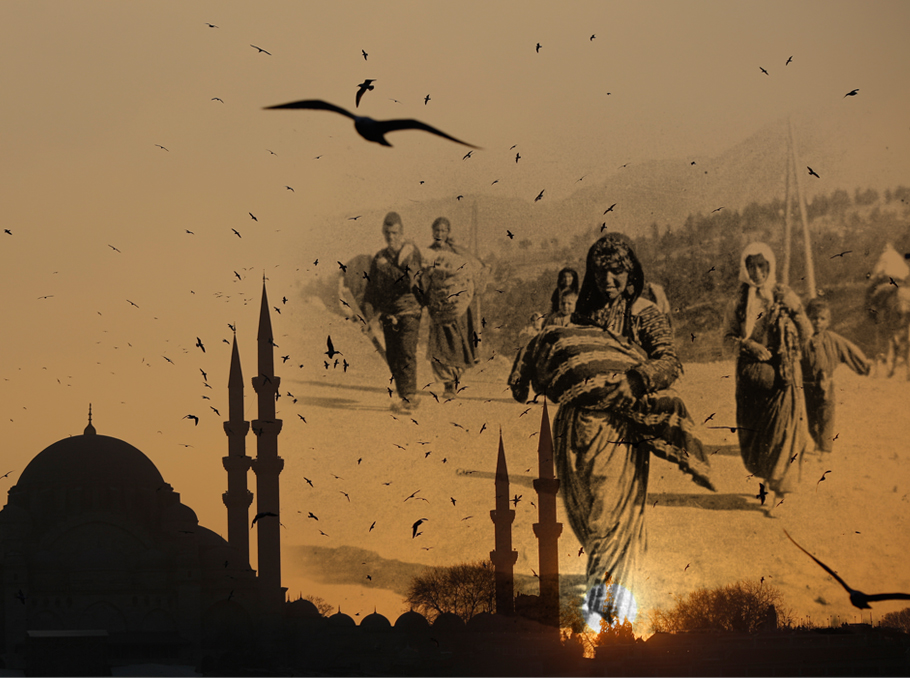In April 2015, the month in which world marked the 100 years since the Armenian genocide, the Guardian asked readers in the country, and those in Diaspora, to share their stories of how the violence had affected their family history.
The project, led by the New East network, had a an overwhelming response with over 500 people sending letters, photos and testimony, some of which were used in the coverage of the centennial.
A year on and Mediamax have worked with the Guardian to revisit some of the stories, published here as we approach the 101st anniversary.![]()
Maria Titizian
When my grandmother moved to Canada, I was 12 years old. She was born in Marash in 1908 in the Ottoman Empire. I had only seen pictures of her. She was the typical Armenian grandmother of her generation, the survivor generation… plump, dressed in dark clothes, long, willowy white hair tied in a bun, round face, full lips and tired eyes. When she finally landed in Toronto, I thought my life would be complete. I had felt the absence of grandparents in my life and I was ready to embrace her wholly.
The first words that came out of her mouth were Turkish and although I had heard enough Turkish at home when my parents wanted to discuss something privately, the Turkish that flowed from her mouth had a slightly different feeling to it.
My preconceived image of a grandmother – loving, giving, caressing – were quickly replaced by a distant woman who just looked sad all the time.
She lived for two years with us and then passed away. She was 62 years old. She looked 80. I remember my mother weeping over the loss of her mother and becoming distant herself for a time.
It was only years later that we learned about the demons that haunted my grandmother, a survivor from Marash who married an orphan from Urfa. She always seemed dejected, always wallowing in some kind of melancholy or yearning, or sadness. I never got to know the colors of her soul. It’s hard to say but it was in that state of melancholy where she seemed to be most comfortable and most contented. I don’t remember her laughing, ever.
I don’t think about her very much. She remains a distant memory. The rare times I do remember her is when I hear Turkish.
I was moved to remember her countless times for a few days last month [March 2014] when I went to Istanbul for the first time. Everywhere I went, the Turkish words I associated with my Marashtsi grandmother seemed to float to the surface of my consciousness. Çocuk, oğlan, kız, ben bilmiyorum and so many other words I had heard in the quiet, endless conversations she would have with my mother.
And it confused me. It was at once familiar and strange, it felt like home yet it wasn’t supposed to be, I needed to hate it but I couldn’t. Conflicting emotions were battling one another causing me to lose my balance. Poise and equilibrium were shattered as the colors, sights and smells of Istanbul, the dishes I had eaten and prepared my whole life, the smell of brewing coffee, the roasting chestnuts sold in carts around the city transformed themselves and became crude images from different periods of my life sketched by a quivering hand on pieces of scrap paper.
As I walked along narrow streets and wide boulevards, as I entered musty old buildings with circular staircases steeped in history or met people I didn’t think I would meet or who even should have existed, those scraps of paper were swirling about, each one narrating a long-forgotten story from my life. I was moved to tears as I am wont to do, I was falling down rabbit holes, I was climbing mountains, I was lost in the labyrinth of history and memory and imagined existence.
As I walked along those narrow streets and wide boulevards of Istanbul, I was in the shadow of my Marashtsi grandmother’s suffering. It was the language that had floated from her mouth the first time I heard her that was engulfing me and guiding me.
There is a lot that can be said about Istanbul if you are Turkish or a tourist or a businessperson. I am still not sure what to say about Istanbul as a Western Armenian who can trace her roots to Marash and Urfa and Musa Ler. It is the East and the West, it is the Orient, it is the new and the old, it is Bourj Hamoud and Paris, it is Muslim and secular, it is Armenian churches tucked away behind heavy wooden doors in a fish market or out in plain view alongside soaring mosques, it is huge with so many small compartments of living all rolled into one inexplicable metropolis.
You meet the Armenians of Istanbul, you hear their lyrical Western Armenian, you listen to their stories and witness their struggles, you confront their reality and you suddenly realize that you don’t know anything at all about them. And you are ashamed at your ignorance while you are humbled by their tenacity, their drive to protect the remaining traces of an Armenian legacy that stretches back for centuries. You don’t know what to do with all this information that has taken up dwelling in your brain. You don’t know how to process it, so you begin to take it apart, piece by piece and you start telling stories.
Armenian cities, towns and villages are all lost. Schools, churches, businesses, homes are all lost. Wealth and prosperity lost. A centuries-old heritage lost. Stories and memories only remain, nothing else...

















